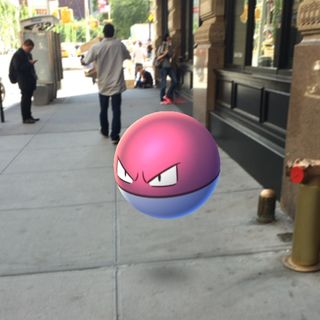Anxiety
The Psychological Pros and Cons of Pokémon Go
Can the game craze actually help people with depression and social anxiety?
Posted July 12, 2016

Amid all the talk about the game craze's numbers, there have also been suggestions that the app can actually help people with depression and social anxiety. While it’s too early to know whether Pokémon Go will help long-term with the treatment of anxiety or depression, the game has successfully encouraged people to go outside, walk, and interact more socially. The app has the potential to benefit people who would not otherwise be motivated or able to leave the house due to fear or anxiety.
The use of virtual and augmented reality technology in medicine to improve psychological and physical health is not new and has an emerging role in the treatment of many disorders. Virtual reality games are currently being used and researched to treat depression, anxiety, and PTSD, as well as to alleviate pain, and even to improve rehabilitation after strokes.
Augmented reality is slightly different than virtual reality because it doesn’t transport you into a new space but keeps you in the real world. Virtual objects, such as the Pokémon in this game, are blended with real objects using GPS. Augmented reality technology has been studied, though less so, as a form of exposure therapy to treat phobias, such as cockroach phobia, as well as post-traumatic stress disorder. It has also been studied, in at least one case, to treat an amputee’s phantom pain, a phenomenon that occurs when a limb is severely damaged or missing. Pokémon Go harnesses the power of augmented reality in a different way by giving people incentives for people to go out and explore.

Here, then, are some of the psychological pros and cons of Pokémon Go:
Pros
- It’s fun, so it provides positive reward in and of itself. Pokémon Go is fun and simple to play. This provides incentive for people to get off the couch and walk around their neighborhood. A basic concept in cognitive behavioral therapy is behavioral activation, which means that if you can go out and experience the positive rewards of healthy behavior, like going to the gym, then you are more likely to feel better and create a positive feedback loop to pursue more healthy behavior.
- The game is structured with clearly defined goals and step-wise levels. Clear structure, immediate feedback, and attainable goals are all very helpful, especially for those with depression, to keep people interested and engaged. A lack of structure can keep people with low energy, fatigue, lack of motivation, and depressed mood in a rut. By creating incremental goals, the game encourages feelings of effectiveness and moving forward.
- It's an easy conversation-starter and can help ease social anxiety. Within an hour of playing Pokémon Go outside, multiple people walking by me started talking about the game. Social anxiety and depression are commonly marked by being socially withdrawn and feeling uncomfortable around other people. With social anxiety, it’s common to feel like you don’t fit in or that other people will judge you. This game has the flexibility to let you play alone but also to be around other people, so it gives you a way out if you want it but also the option to interact with others over something you share in common, so it's low risk interaction. After 48 hours of playing, I can attest that other gamers will feel comfortable talking to you when they see you playing the game. As one teen on the subway noted, when I asked if she felt like people are talking more to each other, "Definitely! I would have never talked to you if you weren't playing the game."
- It is centered around a theme and cartoon that is non-threatening and kawaii. This allows for users to focus on something that is innocent and cute outside of themselves, in contrast to dating apps like Tinder or Happen, in which people may feel like they are being judged or feel pressure to present their image in a certain way. Pokémon Go also has advantages over social networking apps like Facebook or Twitter, where users may feel pressure to produce interesting content or may access information that can induce feelings like jealousy or envy. This game in its simplicity and innocent subject matter minimizes that type of social anxiety, pressure, or potential negative interactions.
- It encourages walking by giving you an incentive to discover and collect new Pokémon and balls to catch them—and it requires you to walk certain distances to hatch "eggs" that you collect. Physical exercise is known to effectively aid depression and overall health, and the app is a useful incentive to go out and walk more.
- You’ll notice things around you that you didn’t before. In the game, you collect items at Pokéstops, which are around the neighborhood in places like sculptures, architectural details, murals, or buildings. While the game does not expand awareness and attention in the same way that meditation or mindfulness does, you will notice more details in your environment that you typically overlook. This can help you develop an appreciation of your surroundings.
- The blending of reality and fantasy can spark your creativity and childhood imagination. Finding cartoons popping up in the middle of buildings and streets can make you feel like a kid, and the app allows you to create some fun and creative photos.
Cons
The game is already getting blamed for some injuries, criticized over data privacy issues, and implicated in crimes, as a few people have used the game to lure players to locations to rob them, so it’s important to exercise appropriate caution.
Here are some of the potential psychological cons or limitations of the game:
- It gets you outside, but you’re still on your phone. While the app does encourage outdoor play, you’re still plugged into technology. (As one teen pointed out to me: Watch out, the game will drain your batteries!) This may not change your life if you're already typically on your phone while walking outside. For children and teens, the American Pediatric Association recommends screen time of just one or two hours a day. (The app does allow you to meet and interact with other players, rather than just look at the phone, which could offset this con.)
- Playing the app makes you more distracted. The app itself features a disclaimer cautioning you to be alert and aware of where you’re going while you’re playing, but there have already been reports of injuries incurred when playing the game. It does put the mind into a blended reality state, in which you’re not quite in the real “present moment” since your eyes are focused on the phone looking at something that isn’t actually there in reality.
- The game puts you in a heightened "stressed" state. Since you’re technically trying to find and catch something, your body is most likely in a fight-or-flight state, meaning your adrenaline is pumping and your heart rate is a bit higher than usual. For a short period, this can be fun, but long-term, you can experience fatigue and feel more worn out, so it’s important to take breaks and make sure you’re not experiencing side effects of excessive gaming.
- The game could cause you to spend more time on your phone and make you less social. Playing the game could actually make you less social and increase the time you're on your phone and not interacting with people "IRL." But this will vary based on an individual's experience.
- The game could exacerbate symptoms for people who have difficulty separating reality and fantasy. The game blends elements of reality with virtual/fantasy elements, so it can be confusing for those who already have difficulty distinguishing out what is real or not, specifically people who may have psychotic symptoms, so it's important to be cautious in that situation and discuss it with your doctor first.
How the pros and cons of the game weigh out over time has yet to be studied scientifically, but so far, fans of the game are out having fun and exploring. If you're finding the game to be helpful for your anxiety, depression, or stress, please share your experiences here.
Marlynn Wei, MD, PLLC © 2016


